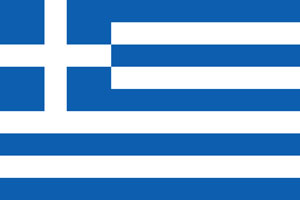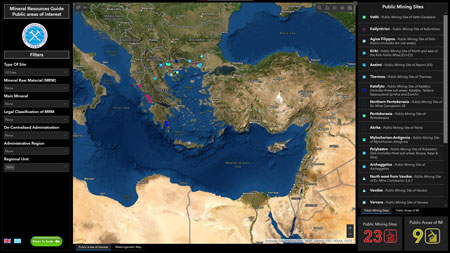Business environment
“Promoting policies that create a business-friendly environment in Greece is pivotal for leveraging foreign and domestic, investments and reinforcing the competitiveness of the Greek economy”. Major areas for improvements and interventions are Setting up, operating, and closing a company, corporate law and directors’ liabilities, Investment licensing, Spatial Planning, Infrastructure Networks & Coastline Affairs, and the Judicial system (Hellenic Federation of Enterprises: (https://en.sev.org.gr/business_priorities/business-environment/).
A snapshot on key issues regarding the performance of Greece’s business environment are presented, based on available information and assessments provided by World Bank (Doing Business reports) and EBRD (The European Bank for Reconstruction and Development).
Doing Business in Greece – Assessments by World Bank
As described at the official World Bank website “Doing Business measures aspects of business regulation affecting small domestic firms located in the largest business city of 190 economies”. Within the framework of World Bank’s annual assessments, 12 areas of business regulation are examined currently. Ten of these areas—starting a business, dealing with construction permits, getting electricity, registering property, getting credit, protecting minority investors, paying taxes, trading across borders, enforcing contracts, and resolving insolvency—are included in the ease of doing business score and ease of doing business ranking. These indicators participate in the forming of the Overall Ease of Doing Business Score (DB20) and affect the Ranking of the economies. As already said 190 economies are examined by World Bank and the rankings for all are benchmarked to May 2019. Doing Business also measures regulation on employing workers and contracting with the government, which are not included in the ease of doing business score and ranking.
The Doing Business reports of World Bank were issued annually until 2021. World Bank decided to discontinue this activity, with Doing-Business-2020 being the last report issued (https://documents1.worldbank.org/curated/en/688761571934946384/pdf/Doing-Business-2020-Comparing-Business-Regulation-in-190-Economies.pdf). Based on the most recent data and information, key notes concerning weaknesses and strengths of Greece’s business environment (https://archive.doingbusiness.org/en/data/exploreeconomies/greece#) are summarized herein.
Summary of main findings by World Bank
Ranking of Greece as compared to the 190 economies and the corresponding scores for each topic (scale 0-100) are shown in Picture 4.1-1 and Table 4.1-1, based on the economy profile of Greece (Doing Business 2020) issued by World Bank (https://archive.doingbusiness.org/content/dam/doingBusiness/country/g/greece/GRC.pdf).
World Bank has identified several reforms achieved by Greece to improve its business environment during the period from 2007 to 2019 (https://archive.doingbusiness.org/en/reforms/overview/economy/greece). Major improvements, as based on the annual Doing Business reports (DB2018 – DB2020) correspond to the topic starting a business which Greece made easier by reducing the time to register a company with the commercial registry and removing the requirement to obtain a tax clearance (DB2020) and by creating a unified social security institution (DB2018). Other improvement achieved in the same area concern lowering of registration costs (DB2015), while starting a business was made easier by introducing a simpler form of limited liability company and abolishing the minimum capital requirement for such companies (DB2014). The implementation of an electronic platform that interconnects several government agencies was regarded also as an improvement in starting a business (DB2012). Thus, based on DB2020 report of World Bank, Greece is ranked at the 11th place amongst 190 economies compared on this topic, with a score 96 (scale 0-100) (Picture 4.1-1 and Table 4.1-1).
On the topic protecting minority investors Greece strengthened protection by requiring greater disclosure and an independent review before the approval of related-party transactions as well as greater corporate transparency of executive compensation (DB2020). Greece is ranked at the 37th place amongst 190 economies compared on this topic, with a score 70 (scale 0-100) (Picture 4.1-1 and Table 4.1-1).
On the contrary, based on the World Bank assessments registering property, getting credit, and enforcing contracts, are areas where further improvements and reforms must be implemented. Dealing with construction permits, paying taxes and resolving insolvency also need some attention to improve the business environment of the Country (Picture 4.1-1 and Table 4.1-1).
Picture 4.1-1: Ranking of Greece on Doing Business 2020 topics amongst 190 economies – Scores (0-100)
(Source: World Bank)
| Doing Business 2020 |
Greece |
| Ease of Doing Business in Greece

|
Region |
OECD high income |
DB RANK |
DB SCORE |
| Income category |
High income |
79
|
68.4
|
| Population |
10.727.668 |
| City covered |
Athens |
| Ranking on Doing Business topics – Greece |
|
11
|
86
|
40
|
156
|
119
|
37
|
72
|
34
|
146
|
72
|
| Starting a Business |
Dealing with Construction Permits |
Getting Electricity |
Registering Property |
Getting Credit |
Protecting Minority Investors |
Paying Taxes |
Trading across Borders |
Endorcing Contracts |
Resolving Insolvency |
|
96.0
|
69.5
|
84.7
|
46.9
|
45.0
|
70.0
|
77.1
|
93.7
|
48.1
|
53.1
|
Table 4.1-1: Greece – Analysis of Ranking on Doing Business 2020 topics amongst 190 economies and Scores (0-100)
(Source: World Bank)
| Starting a Business (rank) |
11 |
|
Getting Credit (rank) |
119 |
|
Trading across Borders (rank) |
34 |
| Score of starting a business |
96,0 |
|
Score of getting credit (0-100) |
45,0 |
|
Score of trading across borders (0-100) |
93,7 |
| Procedures (number) |
3 |
|
Strength of legal rights index (0-12) |
2 |
|
Time to export |
|
| Time (days) |
4 |
|
Depth of credit information index (0-8) |
7 |
|
Documentary compliance (hours) |
1 |
| Cost (number) |
1,5 |
|
Credit registry coverage (% of adults) |
0,0 |
|
Border compliance (hours) |
24 |
| Paid-in min. capital (% of income per capita) |
0,0 |
|
Credit bureau coverage (% of adults) |
69,9 |
|
Cost to export |
|
|
|
|
|
|
|
Documentary compliance (USD) |
30 |
| Dealing with Construction Permits (rank) |
86 |
|
Protecting Minority Investors (rank) |
37 |
|
Border compliance (USD) |
300 |
| Score of dealing with construction permits (0-100) |
69,5 |
|
Score of protecting minority investors (0-100) |
70,0 |
|
Time to export |
|
| Procedures (number) |
17 |
|
Extent of disclosure index (0-10) |
9,0 |
|
Documentary compliance (hours) |
1 |
| Time (days) |
180 |
|
Extent of director liability index (0-10) |
4,0 |
|
Border compliance (hours) |
1 |
| Cost (% of warehouse value) |
1,9 |
|
Ease of shareholder suits index (0-10) |
5,0 |
|
Cost to export |
|
| Building quality control index (0-15) |
12,0 |
|
Extent of shareholder rights index (0-6) |
5,0 |
|
Documentary compliance (USD) |
0 |
|
|
|
Extent of ownership and control index (0-7) |
6,0 |
|
Border compliance (USD) |
0 |
| Getting Electricity (rank) |
40 |
|
Extent of corporate transparency index (0-7) |
6,0 |
|
|
|
| Score of getting electricity (0-100) |
84,7 |
|
|
|
|
Enforcing Contracts (rank) |
146 |
| Procedures (number) |
5 |
|
Paying Taxes (rank) |
72 |
|
Score of enforcing contracts (0-100) |
48,1 |
| Time (days) |
51 |
|
Score of paying taxes (0-100) |
77,1 |
|
Time (days) |
1,711 |
| Cost (% of income per capita) |
68,2 |
|
Payments (number per year) |
8 |
|
Cost (% of claim value) |
22,4 |
| Reliability of supply and transparency of tariff index (0-8) |
7 |
|
Time (hours per year) |
193 |
|
Quality of judicial processes index (0-18) |
12,5 |
|
|
|
Total tax and contribution rate (% of profit) |
51,9 |
|
|
|
| Registering Property (rank) |
156 |
|
Postfiling index (0-100) |
76,7 |
|
Resolving Insolvency (rank) |
72 |
| Score of registering property (0-100) |
46,9 |
|
|
|
|
Score of resolving insolvency (0-100) |
53,1 |
| Procedures (number) |
11 |
|
|
|
|
Recovery rate (cents on the dollar) |
32 |
| Time (days) |
26 |
|
|
|
|
Time (years) |
3,5 |
| Cost (% of property value) |
4,8 |
|
|
|
|
Cost (% of estate) |
9,0 |
| Quality of the land administration index (0-30) |
4,5 |
|
|
|
|
Outcome (0 as piecemeal sale and 1 as going concern) |
0 |
|
|
|
|
|
|
Strength of insolvency framework index (0-16) |
11,5 |
The business environment of Greece based on EBRD assessment
The EBRD uses country diagnostics as a tool to identify the main obstacles to entrepreneurship and private sector development and to help shape the Bank’s strategic priorities and project selection in new country strategies (www.ebrd.com/publications/country-diagnostics). Each diagnostic informs the EBRD’s policy engagement with the authorities in the country. In Greece’s Diagnostic issued by EBRD in 2021 the major advances and drawbacks were identified and are summarized herein.
By early-2020, the Greek economy had been improving steadily for more than two years after a deep, nearly decade-long economic crisis. The coronavirus pandemic abruptly interrupted the recovery, putting the economy back into recession and shifting the focus of the authorities towards short-term crisis-mitigation measures. However, the authorities’ commitment to reform will be crucial in the post-pandemic period. Despite notable progress in many areas including those of public administration, digitalization (especially during the Covid-19 outbreak), and tax collection, further improvements should remain a priority.
In Greece, 99.9 per cent of companies are small and medium size (SMEs), and most SMEs are micro-enterprises, with many firms under-performing, while the number of high growth enterprises is limited. Cost competitiveness has improved during the crisis. Exports of goods (mostly primary products and goods) and services excluding the shipping sector have increased by 66 per cent in real terms since their trough in 2009. Value added products and innovations are needed to increase trade potential. Lack of investment is linked to low levels of productivity and skills, while spending on research and development (R&D) is limited.
Notable progress has been made in governance in recent years. A series of complementary actions, required for the modernization of the public administration, have been completed. The public administration was substantially downsized during the first years of the Greek crisis. However, the state has been operating based on a legal framework which is extensive, complex, fragmented and contradictory. It is noted that the taxation system and framework need improvements to create a more friendly business environment. Attention also should be drawn to the efficiency of the prevailing judicial system. Good progress has been made in developing a Human Resources Management System, including completion of a significant number of digital organigrams and job descriptions. Improvements in digital skills and adoption of new technologies by businesses remain key priorities.
Also, over the last years, Greece has carried out significant reforms in public procurement. These included simplified legislation, use of electronic procurement, a new centralized procurement scheme and the adoption of the National Strategy on public procurement. Since 2016, Law 4412/2016 has transposed the EU Directives on public procurement aiming to codify the existing national provisions on public procurement scattered in various legal texts.
Finally, it should be noted that Greece is well placed to play a leading role in the investment and trade linkages in south-eastern Europe. It occupies a strategic location near the crossroads of Europe, Asia, and Africa. It also shares a land border with Albania, North Macedonia, Bulgaria, and Turkey, and is widely regarded as a gateway to Europe from countries further east and south.

